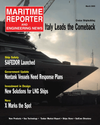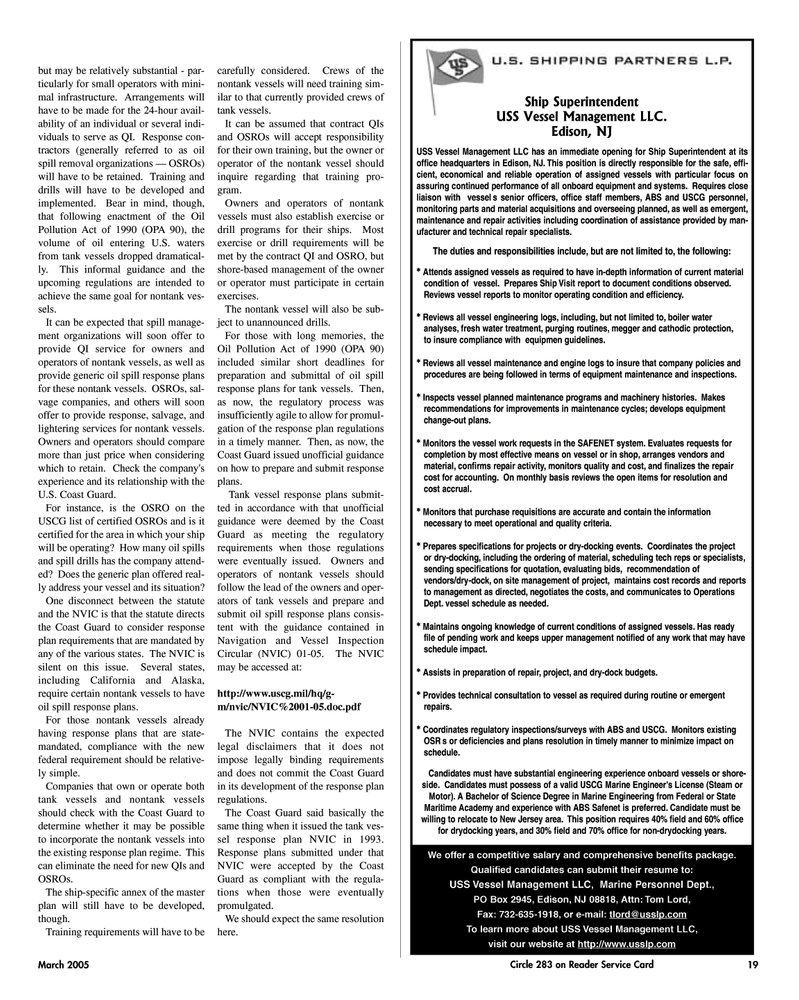
Page 19: of Maritime Reporter Magazine (March 2, 2005)
Read this page in Pdf, Flash or Html5 edition of March 2, 2005 Maritime Reporter Magazine
March 2005 19 but may be relatively substantial - par- ticularly for small operators with mini- mal infrastructure. Arrangements will have to be made for the 24-hour avail- ability of an individual or several indi- viduals to serve as QI. Response con- tractors (generally referred to as oil spill removal organizations — OSROs) will have to be retained. Training and drills will have to be developed and implemented. Bear in mind, though, that following enactment of the Oil
Pollution Act of 1990 (OPA 90), the volume of oil entering U.S. waters from tank vessels dropped dramatical- ly. This informal guidance and the upcoming regulations are intended to achieve the same goal for nontank ves- sels.
It can be expected that spill manage- ment organizations will soon offer to provide QI service for owners and operators of nontank vessels, as well as provide generic oil spill response plans for these nontank vessels. OSROs, sal- vage companies, and others will soon offer to provide response, salvage, and lightering services for nontank vessels.
Owners and operators should compare more than just price when considering which to retain. Check the company's experience and its relationship with the
U.S. Coast Guard.
For instance, is the OSRO on the
USCG list of certified OSROs and is it certified for the area in which your ship will be operating? How many oil spills and spill drills has the company attend- ed? Does the generic plan offered real- ly address your vessel and its situation?
One disconnect between the statute and the NVIC is that the statute directs the Coast Guard to consider response plan requirements that are mandated by any of the various states. The NVIC is silent on this issue. Several states, including California and Alaska, require certain nontank vessels to have oil spill response plans.
For those nontank vessels already having response plans that are state- mandated, compliance with the new federal requirement should be relative- ly simple.
Companies that own or operate both tank vessels and nontank vessels should check with the Coast Guard to determine whether it may be possible to incorporate the nontank vessels into the existing response plan regime. This can eliminate the need for new QIs and
OSROs.
The ship-specific annex of the master plan will still have to be developed, though.
Training requirements will have to be carefully considered. Crews of the nontank vessels will need training sim- ilar to that currently provided crews of tank vessels.
It can be assumed that contract QIs and OSROs will accept responsibility for their own training, but the owner or operator of the nontank vessel should inquire regarding that training pro- gram.
Owners and operators of nontank vessels must also establish exercise or drill programs for their ships. Most exercise or drill requirements will be met by the contract QI and OSRO, but shore-based management of the owner or operator must participate in certain exercises.
The nontank vessel will also be sub- ject to unannounced drills.
For those with long memories, the
Oil Pollution Act of 1990 (OPA 90) included similar short deadlines for preparation and submittal of oil spill response plans for tank vessels. Then, as now, the regulatory process was insufficiently agile to allow for promul- gation of the response plan regulations in a timely manner. Then, as now, the
Coast Guard issued unofficial guidance on how to prepare and submit response plans.
Tank vessel response plans submit- ted in accordance with that unofficial guidance were deemed by the Coast
Guard as meeting the regulatory requirements when those regulations were eventually issued. Owners and operators of nontank vessels should follow the lead of the owners and oper- ators of tank vessels and prepare and submit oil spill response plans consis- tent with the guidance contained in
Navigation and Vessel Inspection
Circular (NVIC) 01-05. The NVIC may be accessed at: http://www.uscg.mil/hq/g- m/nvic/NVIC%2001-05.doc.pdf
The NVIC contains the expected legal disclaimers that it does not impose legally binding requirements and does not commit the Coast Guard in its development of the response plan regulations.
The Coast Guard said basically the same thing when it issued the tank ves- sel response plan NVIC in 1993.
Response plans submitted under that
NVIC were accepted by the Coast
Guard as compliant with the regula- tions when those were eventually promulgated.
We should expect the same resolution here.
We offer a competitive salary and comprehensive benefits package.
Qualified candidates can submit their resume to:
USS Vessel Management LLC, Marine Personnel Dept.,
PO Box 2945, Edison, NJ 08818, Attn: Tom Lord,
Fax: 732-635-1918, or e-mail: [email protected]
To learn more about USS Vessel Management LLC, visit our website at http://www.usslp.com
USS Vessel Management LLC has an immediate opening for Ship Superintendent at its office headquarters in Edison, NJ. This position is directly responsible for the safe, effi- cient, economical and reliable operation of assigned vessels with particular focus on assuring continued performance of all onboard equipment and systems. Requires close liaison with vessel’s senior officers, office staff members, ABS and USCG personnel, monitoring parts and material acquisitions and overseeing planned, as well as emergent, maintenance and repair activities including coordination of assistance provided by man- ufacturer and technical repair specialists. * Attends assigned vessels as required to have in-depth information of current material condition of vessel. Prepares Ship Visit report to document conditions observed.
Reviews vessel reports to monitor operating condition and efficiency. * Reviews all vessel engineering logs, including, but not limited to, boiler water analyses, fresh water treatment, purging routines, megger and cathodic protection, to insure compliance with equipmen guidelines. * Reviews all vessel maintenance and engine logs to insure that company policies and procedures are being followed in terms of equipment maintenance and inspections. * Inspects vessel planned maintenance programs and machinery histories. Makes recommendations for improvements in maintenance cycles; develops equipment change-out plans. * Monitors the vessel work requests in the SAFENET system. Evaluates requests for completion by most effective means on vessel or in shop, arranges vendors and material, confirms repair activity, monitors quality and cost, and finalizes the repair cost for accounting. On monthly basis reviews the open items for resolution and cost accrual. * Monitors that purchase requisitions are accurate and contain the information necessary to meet operational and quality criteria. * Prepares specifications for projects or dry-docking events. Coordinates the project or dry-docking, including the ordering of material, scheduling tech reps or specialists, sending specifications for quotation, evaluating bids, recommendation of vendors/dry-dock, on site management of project, maintains cost records and reports to management as directed, negotiates the costs, and communicates to Operations
Dept. vessel schedule as needed. * Maintains ongoing knowledge of current conditions of assigned vessels. Has ready file of pending work and keeps upper management notified of any work that may have schedule impact. * Assists in preparation of repair, project, and dry-dock budgets. * Provides technical consultation to vessel as required during routine or emergent repairs. * Coordinates regulatory inspections/surveys with ABS and USCG. Monitors existing
OSR’s or deficiencies and plans resolution in timely manner to minimize impact on schedule.
Candidates must have substantial engineering experience onboard vessels or shore- side. Candidates must possess of a valid USCG Marine Engineer's License (Steam or
Motor). A Bachelor of Science Degree in Marine Engineering from Federal or State
Maritime Academy and experience with ABS Safenet is preferred. Candidate must be willing to relocate to New Jersey area. This position requires 40% field and 60% office for drydocking years, and 30% field and 70% office for non-drydocking years.
The duties and responsibilities include, but are not limited to, the following:
Ship Superintendent
USS Vessel Management LLC.
Edison, NJ
Circle 283 on Reader Service Card
MR MARCH 2005 #3 (17-24).qxd 3/1/2005 5:27 PM Page 3

 18
18

 20
20
